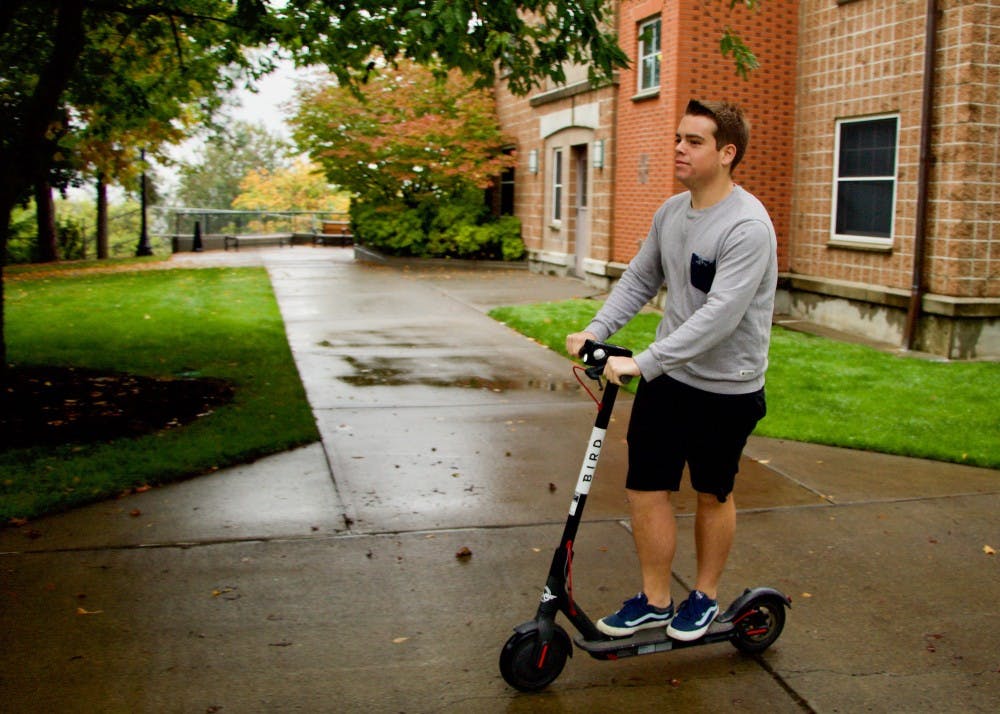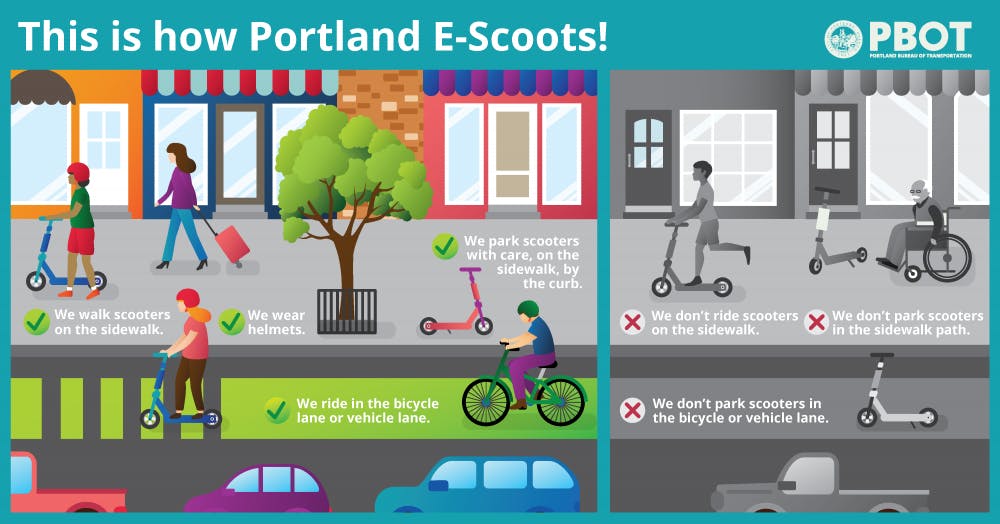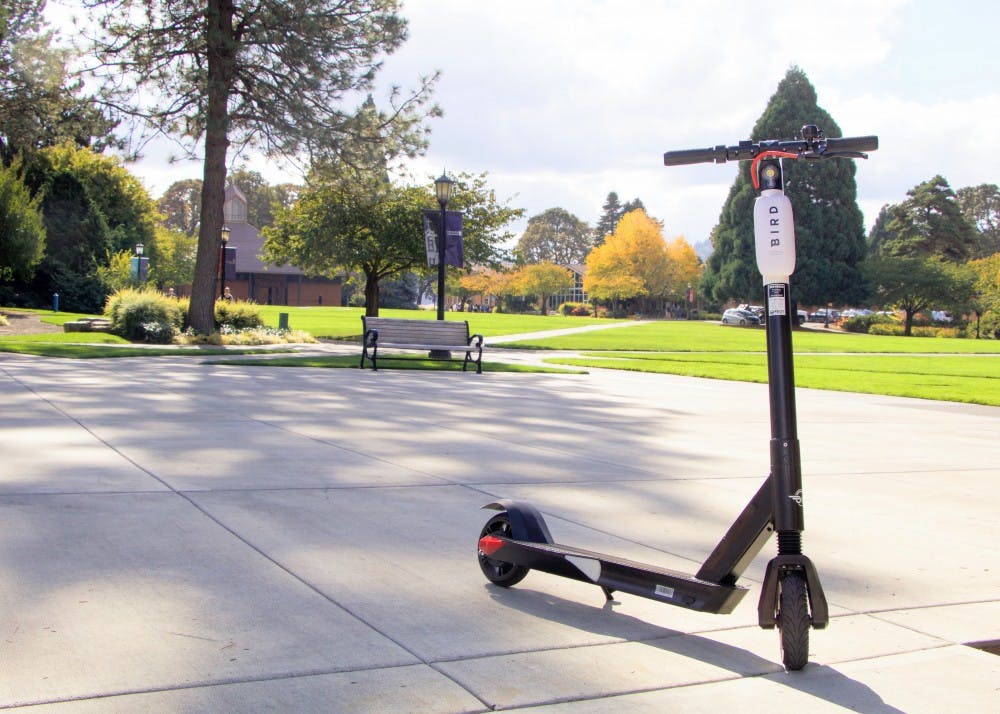Bikes, skateboards and hurried students aren’t the only traffic on campus sidewalks this semester. There’s a newcomer this fall: electric scooters.
Since their debut in Portland at the end of July, electric scooters have taken the city by storm. They have now made their way to campus, offering a new, inexpensive and fun way to get around. While some students find the scooters exciting and convenient, Gerry Gregg, director of public safety, is concerned about their potential safety risks.
“If you’ve got someone walking down the sidewalk, and then all of sudden someone comes up behind them at 15 mph, they don’t see them coming, and then they step in front of them, now we’ve got a crash,” Gregg said. “Screaming across campus on a crowded sidewalk, albeit fun, isn’t necessarily the safest option.”
University policy states that motorized/electric bicycles and other riding devices are not to be ridden on sidewalks or pedestrian paths on campus.
Gregg said that very few students follow these rules. He also said that even though Public Safety could issue tickets for riding bikes or scooters on campus, they don’t. He said their main concern is doing what’s best for the safety of the campus community.
“It may be a long-term reality, and we need to figure out what makes sense for the safety of everybody involved,” Gregg said. “I’d feel a little better about them if people actually wore helmets. I certainly do have some concern about the Friday or Saturday night revelry that they could become a part of. All in good fun until somebody falls off one.”
The Portland Bureau of Transportation (PBOT) has permitted three scooter companies — Bird, Lime and Skip — to operate in the city as part of a four-month pilot program from July to November. The city is testing out the scooters to see if they contribute to Portland’s mobility, equity, safety and climate action goals.

The scooters are designed to be user-friendly. After downloading the scooter company’s app and creating an account, users can scan the QR code on the scooter and it becomes active. All three companies charge an initial $1 to activate a scooter and 15 cents for every minute of usage.
“Sometimes my friends and I are bored, so we just go out, see if there’s any scooters near us, and just ride around the streets around campus,” freshman Colton Ramirez said. “They’re fun. They’re not too expensive. It’s just fun to mess around on them.”
By using GPS technology, users can easily find nearby scooters using the app on their phone. When you’ve reached your destination, you can park the scooter anywhere, though the companies and PBOT remind riders to park them near the curb to keep the sidewalk clear.
Of course, the scooters have to be recharged eventually — this is the job of so-called “chargers,” or individuals who retrieve dead scooters, recharge them and disperse them throughout the city early each morning.
Users sign up to become a charger either online or through the app on their phone. Once hired, the company sends the charging equipment by mail. The pay for charging scooters varies from scooter to scooter, with harder to find scooters often resulting in higher pay. According to an article from The Atlantic, Bird pays $5 to $20 per scooter.
PBOT provides a clear list of scooter guidelines on their website. These include the reminder that state law requires helmets while riding a scooter, as well as instructions to ride in bike lanes when possible and not on sidewalks.

While many students enjoy the scooters on campus, others aren’t so thrilled. Sophomore Sage Taylor isn’t into the scooters. He says he hates them, partly because they pose a threat to drivers.
“I think those things are insane,” Taylor said. “In Portland with the bikes, we don’t need more things on the streets to be in danger of hitting.”
Taylor said that it makes more sense to use the scooters on campus rather than on a busy street. When he first used a scooter, Taylor thought it was strange that he had to provide his drivers license info on the app.
“One of the reasons I like to think you need a driver's license to drive a car is because, you know, a car’s a dangerous thing,” Taylor said. “If we apply that same logic to a scooter, why am I being asked for my driver’s license?”
For freshman Sean Hovland, the scooters allow him and his friends to get off campus and explore St. Johns. He said they’re a less expensive alternative to Uber or Lyft for getting around if you don’t have a car.
“Coming here from LA, my friend group and I started off using Uber a lot, but it got super expensive,” Hovland said. “Then someone told us about the Bird and Lime scooters. Me and my friends have been using those a lot more to go get food on the weekends and do other stuff in St. Johns and whatnot. It’s been way easier and cheaper to get places.”
Wes Cruse is a reporter for The Beacon. He can be reached at cruse20@up.edu.









